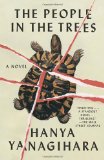Summary | Excerpt | Reviews | Beyond the Book | Readalikes | Genres & Themes | Author Bio

Critics' Opinion:
Readers' Opinion:
First Published:
Aug 2013, 384 pages
Paperback:
May 2014, 496 pages
 Book Reviewed by:
Book Reviewed by:
Amodini Sharma
Buy This Book
I.
I was born in 1924 near Lindon, Indiana, the sort of small, unremarkable rural town that some twenty years before my birth had begun to duplicate itself, quietly but insistently, across the Midwest. By which I mean that the town, as I remember it, was exceptional only for its very lack of distinguishing details. There were silos, and red barns (most of the residents were farmers), and general stores, and churches, and ministers and doctors and teachers and men and women and children: an outline for an American society, but one with no flourishes, no decoration, no accessories. There were a few drunks, and a resident madman, and dogs and cats, and a county fair that was held in tandem with Locust, an incorporated town a few miles to the west that no longer exists. The townspeople--there were eighteen hundred of us--were born, and went to school, and did chores, and became farmers, and married Lindonites, and began families of their own. When you saw someone in the street, you'd nod to him or, if you were a man, pull down the brim of your hat a bit. The seasons changed, the tobacco and corn grew and were harvested. That was Lindon.
There were four of us in the family: my father, my mother, and Owen and me. (1) We lived on a hundred acres of land, in a sagging house whose only notable characteristic was a massive, once-grand central staircase that long before had been transformed by generations of termites into a lacy ruin.
About a mile behind the house ran a curvy creek, too small and slow and behaviorally inconsistent to warrant a proper name. Every March and April, after the winter thaw, it would surpass its limitations and become a proper river, swollen and aggressive with gallons of melted snow and spring rain. During those months, the creek's very nature changed. It became merciless and purposeful, and seized from its outgrown banks tiny, starry bloodroot blossoms and wild thyme by their roots and whisked them downstream, where they were abandoned in the thicket of a dam someone unknown had built long ago. Minnows, the creek's year-round inhabitants, fought upstream and drowned. For that one season, the creek had a voice: an outraged roar of rushing water, of power, and that narrow tributary, normally so placid and characterless, became during those months something frightening and unpredictable, and we were warned to keep away.
But in the heat of the summer months, the creek--which didn't originate at our property but rather at the Muellers', who lived about five miles to the east--dried once again to a meek trickle, timorously creeping its way past our farm. The air above it would be noisy with clouds of buzzing mosquitoes and dragonflies, and leeches would suck along its soft silty bottom. We used to go fishing there, and swimming, and afterward would climb back up the low hill to our house, scratching at the mosquito welts on our arms and legs until they became furry with old skin and new blood.
My father never ventured down to the creek, but my mother used to like to sit on the grass and watch the water lick over her ankles. When we were very young, we would call out to her--Look at us!--and she would lift her head dreamily and wave, though she was just as likely to wave at us as she was to wave at, say, a nearby oak sapling. (Our mother's sight was fine, but she often behaved as a blind person would; she moved through the world as a sleepwalker.) By the time Owen and I were seven or eight or so (at any rate, too young to have become disenchanted with her), she had become an object of at first pity and, soon after, of fun. We'd wave at her, sitting on the bank, her arms crossed under her knees, and then, as she was waving back at us (with her whole arm rather than simply her hand, like a clump of seaweed listing underwater), we'd turn away, talk loudly to each other, pretend not to see her. Later, over dinner, when she'd ask what we'd done at the creek, we'd act astonished, perplexed. The creek? But we hadn't been there! We were playing in the fields all day.
Excerpted from The People in the Trees by Hanya Yanagihara. Copyright © 2013 by Hanya Yanagihara. Excerpted by permission of Doubleday, a division of Random House LLC. All rights reserved. No part of this excerpt may be reproduced or reprinted without permission in writing from the publisher.





The Funeral Cryer by Wenyan Lu
Debut novelist Wenyan Lu brings us this witty yet profound story about one woman's midlife reawakening in contemporary rural China.
Your guide toexceptional books
BookBrowse seeks out and recommends the best in contemporary fiction and nonfiction—books that not only engage and entertain but also deepen our understanding of ourselves and the world around us.